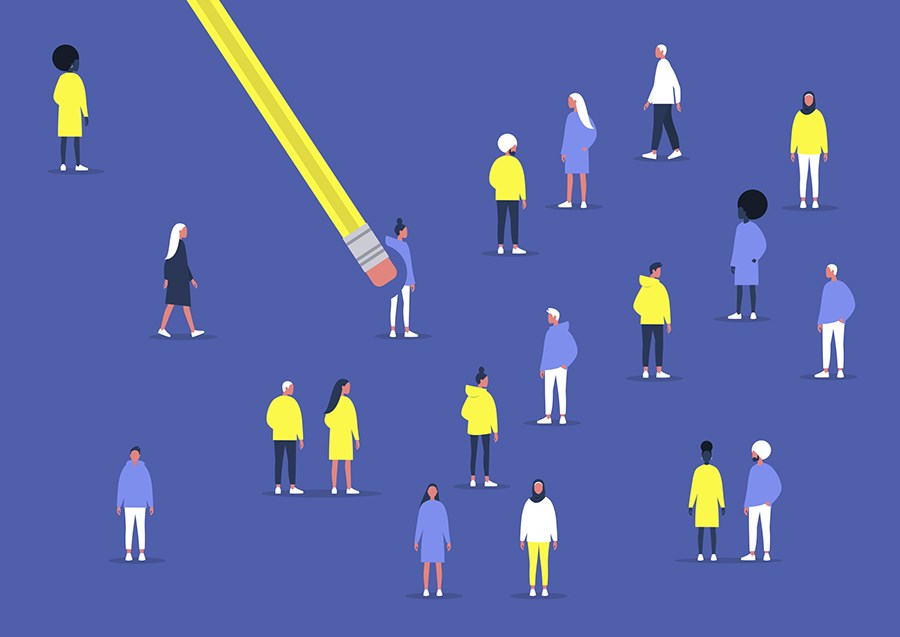We could hear him crying from his balcony.
My wife and I were snuggled with our newborn daughter about a month into the pandemic when our neighbour on the fourth floor began to lose it. He was a bright-faced hipster guy in his twenties who worked in kitchens and liked to get drunk with his friends, but with the beginning of COVID-19 he’d been sequestered to his apartment, where he was having increasingly histrionic fights with his Facebook friends over political issues. Black Lives Matter was a freshly coined slogan at the time, and people were engaged in impassioned, cutthroat political activism all over everybody’s feed. He was like chum in a shark fight.
“How can you call me racist? How can you even say that? You know how much love I have for everybody regardless of skin colour. I have a black girlfriend!” he shouted into his cell phone, his voice breaking, while we eavesdropped.
“That’s not what racism means! You can’t just change the definition of words without telling anyone! This makes no sense! I’m not a racist!”
Later, when I ran into him on the street, he was uncharacteristically sombre as he told me about the dozens of people who had unfriended him on Facebook. His hood up around his face, his fists tunnelled into his pockets, he described how people he’d known for years had completely disavowed him in disgust because of what he was saying online. He was genuinely heartbroken to learn that some of his friendships were so weak. This was before society had ubiquitized the term Cancel Culture, but that was exactly what he was going through.
I was a member of the last generation to make it through high school without social media. My neighbour was fifteen years younger than me, yet this new culture was as alien and frightening to him as it was to me. The coming generation had found something to fill the black hole left by Christianity and had created a pseudo-religion in which woke scolds constantly scrutinize each other for evidence of wrongthink, ensure doctrinal adherence through the use of slogans and mantras, and virtue-signal like their lives depend on it. These kids had become exactly like the church elders my generation had rejected, scolding people for using the wrong language or associating with the wrong people. It was like a zombie apocalypse of the mind, and we were losing.
The problem with Cancel Culture is that in seeking to enact social justice, it fails to consider the most basic moral calculus of all: the Golden Rule. Rather than seeing a problematic person as worthy of redemption, it seeks to expunge the problem via social exile.
Down in Vancouver, a nurse named is currently under investigation by the 小蓝视频 College of Nurses and Midwives largely because activists object to her social media stances on the gender controversy swirling around children’s author J.K. Rowling.
The most astonishing thing is that she’s being accused of hate by a swarm of vengeful activists who nonetheless feel comfortable posting rape threats and calling for a young single mother to lose her livelihood. As if nurses didn’t have enough to deal with during the pandemic.
The hypocrisy has reached nuclear levels.
That’s just one example of the de-platforming and social media mobbing that’s going on today. In certain arenas, particularly Twitter, simply stepping out to participate in the conversation feels like an invitation to be doggy-piled and harangued. I personally know five people who have been institutionalized for mental health breaks following heavy social media use, a problem I’m sure was exacerbated by the pandemic isolation and by Cancel Culture itself.
I never actually saw the posts that my neighbour wrote to set everything off back in 2020, the ones that got him excommunicated by his friends. But I talked to him in depth about his thoughts and feelings around the George Floyd protests afterwards, and found that he was actually passionate about racial justice issues — he was just voicing this in a way that people didn’t like, or understand. That’s part of the injustice of online division, is it’s the people who care that end up with a target on their backs. The people willing to stick their heads up over the parapets to voice an opinion.
We spent an evening on his balcony drinking beer and talking about the world, and never once went anywhere near social media. If this was exile, it wasn’t too bad.
Will Johnson is a journalist and father who freelances for The 小蓝视频.



